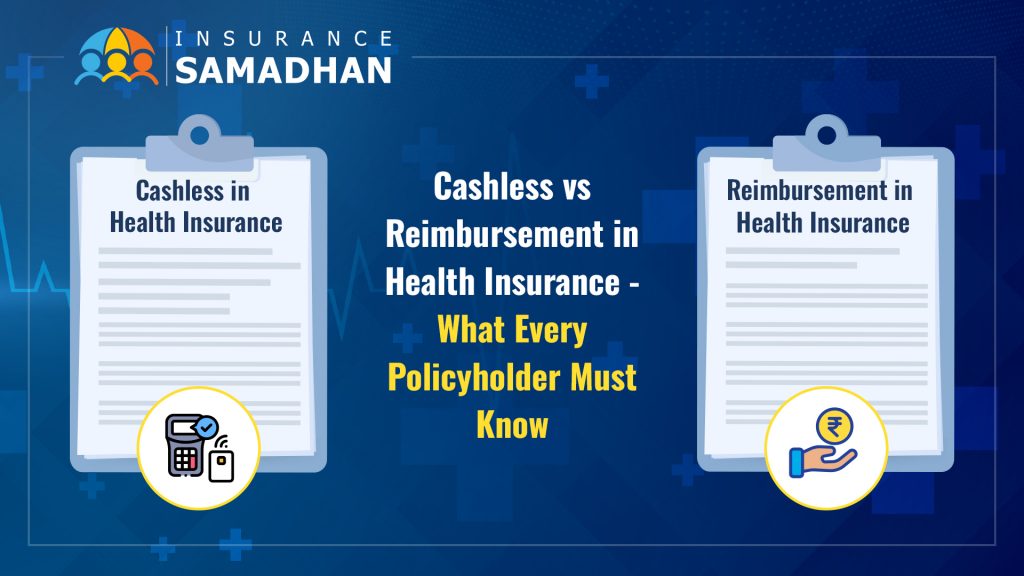Health insurance promises peace of mind during medical emergencies, but when the actual claim process begins, policyholders often get confused between cashless and reimbursement claims. Both are valid, yet they differ in process, documentation, and timelines. Knowing the difference – and filing documents correctly – can determine how quickly your claim is settled.

Cashless Claims: No Payments at the Hospital Counter
A cashless claim allows you to receive treatment without paying bills upfront. The hospital settles directly with your insurer or TPA (Third-Party Administrator).
But there’s one condition: the hospital must be part of your insurer’s network.
Steps for a Smooth Cashless Experience
- Check network status before admission – Use your insurer’s app, website, or contact number to confirm if the hospital is on the cashless panel.
- Get pre-authorization – Submit your insurance card and a doctor’s diagnosis; the hospital sends a pre-auth form to the insurer.
- Wait for approval – This usually takes a few hours (in planned admission) or can be immediate in an emergency.
- Pay only non-covered expenses – Things like consumables, registration fees, or non-medical items are usually excluded.
If a hospital claims to be “cashless” but the insurer later refuses authorization, don’t panic — you can still switch to reimbursement mode (explained below).
Reimbursement Claims: Pay First, Claim Later
In this process, you pay the hospital bill yourself and later submit documents for reimbursement. It applies when:
- You go to a non-network hospital, or
- Cashless was denied during treatment.
Correct Document Filing for Reimbursement
To avoid rejections or delays, make sure your submission is complete and error-free. Typical documents include
- Claim form (signed by you and hospital)
- Original hospital bills, discharge summary, investigation reports
- Prescriptions, pharmacy bills, diagnostic receipts
- Copy of your insurance card and ID proof
- Cancelled cheque for claim transfer
Always keep photocopies and organize documents in sequence. Missing even one critical page can delay settlement.
Which One Is Better?
Both are useful, but cashless is faster and stress-free when available. However, reimbursement ensures you’re still covered at hospitals outside the insurer’s tie-ups.
Pro tip: Always verify network hospital status at the time of admission — not during discharge. Hospitals can be removed or added anytime, and many policyholders discover too late that the hospital is no longer on the insurer’s list.
How Insurance Samadhan Helps
At Insurance Samadhan, we’ve helped thousands of policyholders facing delays, document issues, or denial under both cashless and reimbursement modes. Our experts review claim files, identify missing documents, and help represent your case with the insurer or Ombudsman under IRDAI’s grievance mechanism.
Whether your cashless was denied or reimbursement delayed, the key is proper documentation and timely follow-up. We ensure your genuine claim doesn’t get lost in paperwork.
Click here to register your complaint with Insurance Samadhan
Visit our website: insurancesamadhan.com
Mail us at corporate@insurancesamadhan.com
Cashless claims mean the insurer pays the hospital directly. In reimbursement, you pay first and get refunded later after submitting documents.
Visit your insurer’s website or app, or call their helpline. Always confirm before admission to avoid denial.
Claim form, original bills, discharge summary, prescriptions, diagnostic reports, payment receipts, ID proof, and cancelled cheque.
Pay the hospital, keep all bills, and file a reimbursement claim later. Mention “cashless denied” in your claim form for clarity.
Common reasons include incomplete documentation, missing bills, wrong bank details, or delayed submission beyond IRDAI timelines.
We assist policyholders in preparing proper claim documents, representing cases before insurers, and escalating unresolved claims to IRDAI or the Insurance Ombudsman.